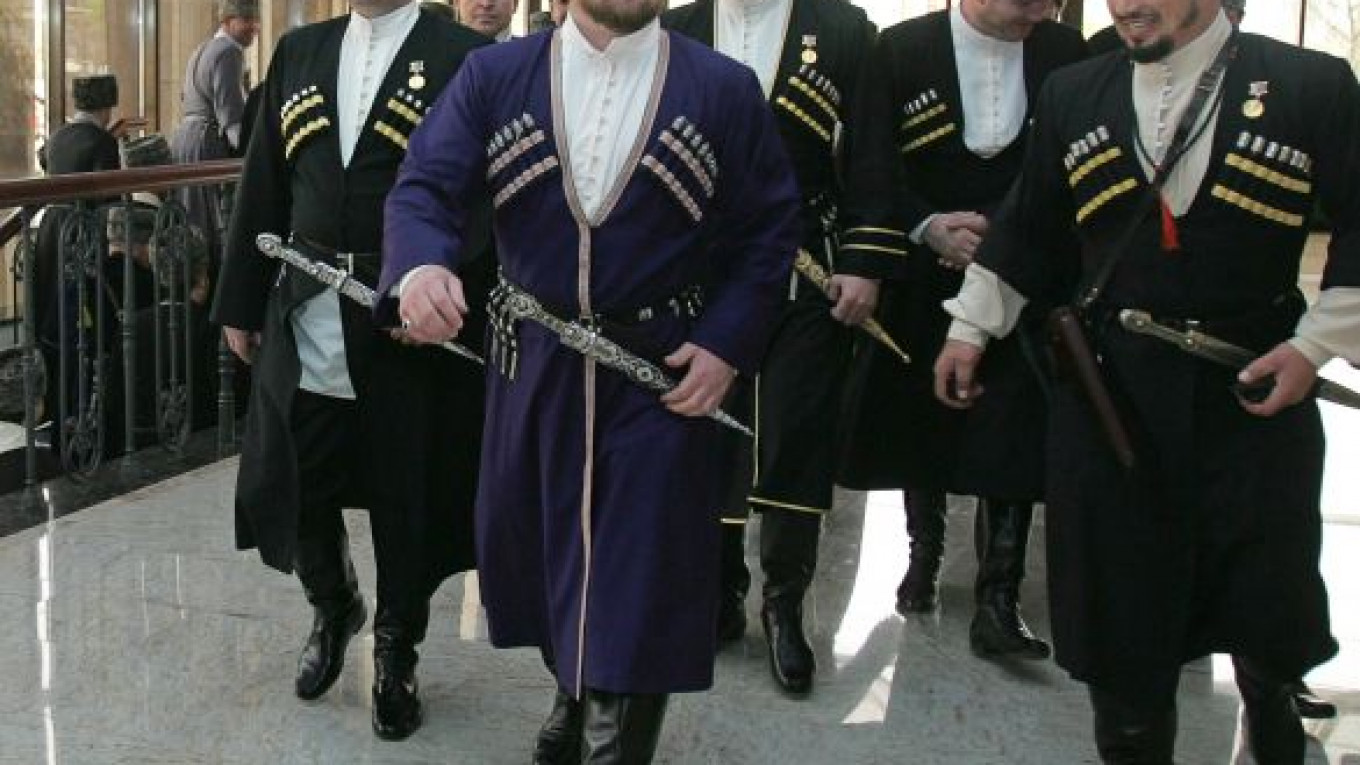Investigators probing the murder of a Chechen refugee in Vienna have uncovered strong trails that lead straight to Ramzan Kadyrov, opening the unprecedented possibility that Austria might press charges against the Chechen president.
Among the evidence are photographs and documents that show that the man suspected of organizing the January 2009 killing of Umar Israilov knew Kadyrov personally and had been in close contact with one of his aides, media reports said this week.
Gerhard Jarosch, a spokesman for Vienna prosecutors, confirmed the reports Thursday but denied speculation that his agency would decide about an indictment soon. "We are working on this now, but I cannot say when we will be finished," he told The Moscow Times.
But prosecutors are nowhere close to pressing charges against Kadyrov, Jarosch said by telephone fr om Vienna. "We would first have to decide about opening an investigation against him."
Kadyrov vehemently denied that he had anything to do with the crime, complaining that it is has "become fashionable" to blame him for everything. "If somewhere a cow goes missing, it is now common to accuse Kadyrov," he said in comments released on his web site.
He also said Israilov had left many blood enemies in his native Chechnya, suggesting that they were responsible for the killing.
But a report by the anti-terror unit of Vienna police names Otto Kaltenbrunner, a Chechen refugee living in Austria, as the "main contracted offender" and Kadyrov and his aide Shaa Turlayev as the "principal offenders," according to excerpts published by Peter Pilz,a Green party deputy in the Austrian parliament.
Kaltenbrunner is one of three Chechen suspects currently imprisoned in Austria. He has been living in the Austrian town of St. Pölten as a political refugee and adopted a German name according to a local law, Jarosch said.
The police report gave his original name as Ramzan Edilov. It also names the other suspects as Lecha Bogatyryov, Turpal-Ali Yeshurkayev and Muslim Dadayev.
Bogatyryov — whose name is transliterated as Letscha Bogatirov — is accused of being the killer, having fired at least two fatal shots into Israilov. He managed to flee Austria and return to Russia, Jarosch said.
Yeshurkayev and Dadayev are both imprisoned on suspicion of being accomplices. Investigators believe that Bogatyryov and Yeshurkayev confronted Israilov after he stepped out of a grocery shop close to his Vienna home on Jan. 13, 2009. The two then chased him through the street in midday and shot at him several times.
Dadayev is accused of driving the getaway car.
Reports in Austrian media suggested that the three left behind a trail of evidence, including footage in a video surveillance camera, gunpowder on their clothes and cell phone calls.
Kaltenbrunner's phone contained a photo wh ere he and Kadyrov are embracing each other, Vienna's Falter magazine reported earlier this week.
Investigators also traced one of his calls to Turlayev, The New York Times reported.
Turlayev, a former rebel fighter who went over to Kadyrov's pro-Moscow government, has been implicated in organizing a contract killing before. Khavazhi Yusupov, a former bodyguard to Isa Yamadayev, said in a video published last week that Turlayev and Kadyrov had ordered him to kill his boss last year.
But Jarosch, the prosecutors' spokesman, said the police report did not carry conclusive evidence.
He pointed out that the report said "it is to be assumed that Israilov's murder really was ordered from the very top (Kadyrov)." To conclude that Kadyrov gave a definite order to kill is exaggerated, he said: "There is no evidence for such an order." ?
But Pilz, the Austrian lawmaker, said this probably reflected political pressure. "There are strong efforts from the government to keep Russian government officials out of the investigation," he told The Moscow Times on Thursday.
Earlier media reports that suggested that Israilov was killed in a dispute over $450,000 were probably part of that effort, he said.
An Austrian paper reported last year that the money, which stemmed from criminal activities, was taken by Israilov when he fled from Chechnya to Austria.
Pilz also said there were signs that two key witnesses for the case were dead. One of them, Salman Muvlayev, was shot last fall in Azerbaijan, he wrote on his web site. The other, Artur Kurmakayev, has been reported missing, he added.
Muvlayev and Kurmakayev were the main informants who told Austrian police that an attempt on Israilov's life was planned, Pilz said.
Kremlin spokespeople were unavailable for comment Thursday. But Vladislav Belov, an analyst with the Moscow State International Relations Institute, said the government should have no reason to fear even an indictment against Kadyrov.
As a full member state of the European Union, Austria has the right to charge him, Belov said.
"If there are substantial and logical reasons, they should indict him. And the government should cooperate, for only this will improve cooperation with European law enforcement authorities," he said.
A Message from The Moscow Times:
Dear readers,
We are facing unprecedented challenges. Russia's Prosecutor General's Office has designated The Moscow Times as an "undesirable" organization, criminalizing our work and putting our staff at risk of prosecution. This follows our earlier unjust labeling as a "foreign agent."
These actions are direct attempts to silence independent journalism in Russia. The authorities claim our work "discredits the decisions of the Russian leadership." We see things differently: we strive to provide accurate, unbiased reporting on Russia.
We, the journalists of The Moscow Times, refuse to be silenced. But to continue our work, we need your help.
Your support, no matter how small, makes a world of difference. If you can, please support us monthly starting from just $2. It's quick to set up, and every contribution makes a significant impact.
By supporting The Moscow Times, you're defending open, independent journalism in the face of repression. Thank you for standing with us.
Remind me later.


